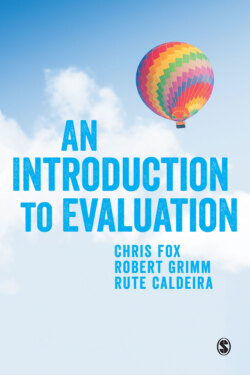Читать книгу An Introduction to Evaluation - Chris Fox - Страница 24
На сайте Литреса книга снята с продажи.
Ex ante and ex post evaluations
ОглавлениеEvaluation can be prospective or retrospective. A prospective or ex ante evaluation takes place before a programme or project has been implemented, whereas a retrospective or ex post evaluation takes place once a programme or project is in place and has demonstrated that it has had an impact (Rossi et al. 2004).
Ex ante evaluations are most commonly undertaken by governments or similar bodies as part of the policy and programme development cycle. They normally have a strong economic component. The European Commission (2001) defines ex ante evaluation thus:
Ex ante evaluation is a process that supports the preparation of proposals for new or renewed Community actions. Its purpose is to gather information and carry out analyses that help to define objectives, to ensure that these objectives can be met, that the instruments used are cost-effective and that reliable later evaluation will be possible. (European Commission 2001: 3)
Ex post evaluation is far more common than ex ante evaluation and the bulk of this book concentrates on approaches more commonly associated with ex post evaluation.
The distinction between ex ante and ex post evaluation alerts us to the idea that different types of evaluation will be relevant at different points in the policymaking or programme development process. The Public Service Transformation Network (2014) identified a series of stages in a project or programme life-cycle: development and design; implementation; delivery; and scaling-up. They suggest that various types of evaluation are likely to be relevant at different stages in this lifecycle, as illustrated in Figure 1.1.
However, the underlying assumption in this model is that policymaking is a rational process. The rational model suggests a logical and ordered sequence of policymaking phases that follow a linear process and where evaluation knowledge is apolitical and neutral (Stone et al. 2001). However, many would argue that the reality of policymaking is more complicated. Clearly, policymakers do not just rely on evidence generated from robust evaluations: they bring their own experience, expertise and judgement to the process (Davies 2004). Policymaking also takes place within the context of finite resources and this influences decisions (ibid). Policymakers are also influenced by values (their own, as well as those of politicians and of institutions) along with the habits and traditions of institutions such as Parliament, civil servants and the judiciary (ibid). Outside forces such as lobby groups, pressure groups and consultants are able to influence the policymaking process and that whole process is subject to pragmatics and contingencies such as parliamentary terms and timetables and the capacities of institutions (ibid). Thus many commentators prefer the phrase ‘evidence-informed policy’ (e.g. Treadwell Shine and Bartley 2011).
Figure 1.1 Evaluation through the lifecycle of a policy or programme (source: Public Service Transformation Network 2014, Figure 1.1)
However, some would go further and question the extent to which evidence-based policymaking actually takes place at all. Stone et al. (2001) set out alternative models of policymaking where the role of evidence and of evaluators is either marginal (for example, in a ‘muddling through’ model of policymaking premised on the notions of ‘bounded rationality’ and ‘satisficing’) or only influential at certain stages in the development of a ‘policy paradigm’.
